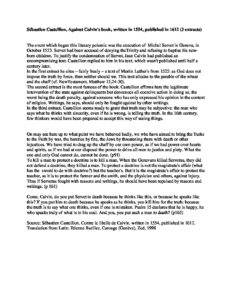The event which began this literary polemic was the execution of Michel Servet in Geneva, in October 1553. Servet had been accused of denying theTrinity and refusing to baptise his new-born children. To justify the condemnation of Servet, Jean Calvin had published an uncompromising text. Castellion replied to him in his text, which wasn’t published until half a century later.
In the first extract he cites – fairly freely – a text of Martin Luther’s from 1525: as God does not impose the truth by force, then neither should we. This text alludes to the parable of the wheat and the chaff (cf. NewTestament, Matthew 13,24-30).
The second extract is the most famous of the book. Castellion affirms here the legitimate intervention of the state against delinquents but denounces all coercive action in doing so, the worst being the death penalty, against someone who has only expressed his opinion in the context of religion. Writings, he says, should only be fought against by other writings.
In the third extract, Castellion seems ready to grant that truth may be subjective: the man who says what he thinks with sincerity, even if he is wrong, is telling the truth. In the 16th century, few thinkers would have been prepared to accept this way of seeing things.
On may see here up to what point we have behaved badly, we who have aimed to bring the Turks to the Faith by war, the heretics by fire, the Jews by threatening them with death or other injustices. We have tried to drag up the chaff by our own power, as if we had power over hearts and spirits, as if we had at our disposal the power to drive all men to justice and piety. What the one and only God cannot do, cannot be done. (p91)
To kill a man to protect a doctrine is to kill a man. When the Genevans killed Servetus, they did not defend a doctrine, they killed a man. To protect a doctrine is not the magistrate’s affair (what has the sword to do with doctrine?) but the teacher’s. But it is the magistrate’s affair to protect the teacher, as it is to protect the farmer and the smith, and the physician and others, against injury. Thus if Servetus fought with reasons and writings, he should have been repulsed by reasons and writings. (p 161)
Come, Calvin, do you put Servet to death because he thinks like this, or because he speaks like this? If you put him to death because he speaks as he thinks, you kill him for the truth: because the truth is to say what one thinks, even if one is mistaken. Psalm 15 declares that he is happy, he who speaks truly of what is in his soul. And you, you put such a man to death? (p165)
